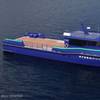Sustainable Future for Maritime Professionals
Sustainability features strongly in The Nautical Institute’s latest Strategic Plan, which has just been published and will run to 2020. It incorporates the views of 1,400 members who responded to a call to help guide the Institute’s work.
Captain Robert McCabe FNI, President of the Institute, said the organisation needed to “plot its course” in a challenging world where there were “more sensitivities, more regulations, more accountability, more technology, more trade, more ships, less water space, and greater competition from other industries offering opportunities to bright young people.”
“Sustainability can also apply to professions,” pointed out Captain McCabe. “A cornerstone of sustainability is knowledge, and knowledge in a rapidly changing environment can only be gained by sharing. The sharing of knowledge is one of our core foundations and the Institute has been distributing knowledge and best practice since its inception.”
Members cited five areas of training where the Institute should work to improve best practice:
* Shiphandling and seamanship
* Ice navigation
* Tug operation
* Fast craft operation
* Offshore-focused operations.
“Sustainability also means reaching out to the younger generations who join our profession and helping them to develop themselves,” said Captain McCabe. “We need to recognise that the assertion of ‘competency’ that comes from a freshly gained STCW certificate is only the start of becoming an expert seafarer.”
The Institute is committed to raising competency levels, particularly by encouraging mentoring. “We must promulgate best practice. We must work with industry to ensure that working environments are conducive to mentoring, and we must motivate all professionals to mentor,” said Captain McCabe.
CPD – continuing professional development - is also at the heart of sustainability. Captain McCabe outlined the benefits: “The Institute’s scheme is based on a cycle of research, plan, record and
reflect. Members of the Institute who wish to take a more formal approach to reflect on their development can have their records reviewed with feedback.”
The President concluded: “The Institute’s mission is to support those involved in the control of sea-going ships. If these people are to have a sustainable profession it will be no coincidence: it will take effort, thoughtfulness and cooperation. The Institute is committed to playing its part in this sustainable future.”
In response to the poll mentioned above, Institute members said they wanted:
* A focus on the realities of managing a modern, integrated ship
* New technology that is not complex or difficult to use
* Regulations that reflect seafarers’ workloads and result in a smaller administrative burden
* Promotion of leadership and management best practices at sea and ashore
* Training to be prioritised, particularly in technical subjects
* Recognition of performance and limitation issues for smaller ship complements
* Those ashore to recognise that seafarers are not super-human
* Shipboard automation designed, tested and introduced with human beings in mind
* More standardisation of new technologies and equipment on board.
The Institute’s work will therefore cover navigation audits, mentoring, usability, navigation safety and competency, and developing knowledge, expertise and best practice in these areas, all supported by publishing and membership activities. The Institute will continue to provide professional and practical input to the work of the IMO, ensuring members’ concerns are effectively addressed within the industry.













